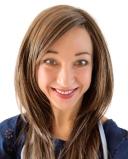
Health
In Sickness and in Health
A journey through medical training against the backdrop of anorexia.
Posted July 23, 2020
I realised I wanted to be a doctor when I was 7 years old. I imagined adopting the persona of some form of quasi-superwoman, needing neither food nor rest as she tended to the sick, stethoscope slung casually around her neck, white coat flapping cape-like in her wake. The reality has been rather different—not just because white coats were banned in UK hospitals in 2005—but I suppose if you squint a little you could say I’m living a grittier version of the dream.
Looking back, I was a walking cliché. I was a highly anxious and perfectionistic child, deeply empathetic and caring, and very sensitive to change and criticism—in hindsight, exhibiting all the temperament and personality traits that make a person vulnerable to developing an eating disorder. I put an immense amount of pressure on myself to perform well academically and developed anorexia just after starting secondary school. Although I didn't receive any formal treatment, I managed to weight restore and remained well enough to complete my secondary education and secure a place in medical school. I subsequently had several relapses, both as an undergraduate and as a junior doctor, but generally managed to maintain my weight at an acceptable level.
Throughout this time I was pretty anosognostic and genuinely thought I was "better." I didn’t talk about anorexia, partly because I simply didn’t see the point. I had meaningful friendships and relationships, functioned well socially, over-achieved spectacularly academically, and assumed a life consumed by daily calorie counting and exercise obsession was as good as it was going to get. I also believed that the characteristics of perfectionism, self-discipline, and determination that contributed to my eating disorder were fundamental to my successes in life—so why on Earth would I challenge them?

I am one of the lucky ones. I am married to a wonderful man I met at university, have four beautiful children and a career I love—but I know that I only have all these things because of the times I’ve been well. Anorexia sucks the joy from life and leads to misery, isolation, loneliness, obsession, and rigidity—and it took me a long time to realize that I have achieved everything I have in spite of anorexia, not because of it.
I relapsed badly shortly after the birth of my fourth child. It had been a tough year—my husband was diagnosed with cancer, I broke my arm and was diagnosed with osteoporosis, and my grandmother, who had always been my rock and inspiration, passed away. I was forced to acknowledge the severity of my illness and accessed treatment for the first time. I was working towards a Ph.D. and the orderly research environment allowed me to devote the time and attention required to properly focus on weight restoration and challenge my distorted thinking.
After a great deal of hard work and expensive therapy, I reached a stage that could have been called 'recovery.' It remained a daily challenge but I was amazed by how much progress I made and how different life could be. I did, however, find it very difficult to come to terms with the fact that I was been ill for most of my adult life and didn't even notice.
The understanding I developed about myself and my illness led me to question the decisions I had made throughout my professional training. My tendency towards perfectionism and over-achievement was congruous with a career in a competitive field like oncology, but I was concerned it may not be so with recovery. I was also aware that I had dealt with the emotional aspect of clinical work through the numbing effect of starvation, but was yet to find something to replace this with.
When I completed my research and returned to the wards, my old coping mechanisms were no longer an option and I found caring for dying children incredibly distressing. I tried mindfulness, distraction, reflection ... nothing worked as well as anorexia. The busy and stressful nature of clinical medicine provided the perfect excuse to miss meals, and once the hunger high kicked in and I succumbed to the silent seduction of weight loss I found myself unable to reinstate even the bare minimum. To cut a long story short, I relapsed again—almost to the point of staring the skeletal spectre of death in the face and realising I was not, and never had been, its master.
As a professional woman with a job that involves making complicated decisions affecting other people’s lives, admitting I was unable to feed myself was not easy. After decades of silence, however, I started to open up to those around me and summoned the courage to ask for help. And, when I was brave enough to remove my armour and show my vulnerability, I was amazed by the kindness and support I received from my friends, colleagues, and seniors.
As I recovered I started to address my concerns that the job I love may not be compatible with a happy and healthy life. I find what I do incredibly rewarding, have made many sacrifices to get where I am, and feel incredibly privileged to do the work I do. However, I also have a wonderful family and need to be well for them—and myself. After going round and round in circles trying to understand which parts of my job are modifiable, which aspects of my character need addressing to do the job safely, and which I need to accept (or not), I am finally finding a balance that is working for me. Managing my own illness has made me a better doctor—there are some things you can only understand if you’ve been on the other side and accept your own humanity.
I hope I have finally learned enough and gained sufficient insight to maintain a stable recovery. I am happy and healthy, love what I do, and feel that I have developed enough healthy coping strategies to deal with the stress and intense emotional burden clinical medicine ensues. I do, however, know that my experience is far from unique, and hope that sharing this may prevent others from stumbling blindly into the quicksand that sucked me down again, and again. I also want to encourage anyone who recognises themselves in any of this to view themselves with a little self-compassion—because recovery isn’t linear, and none of us are perfect.



